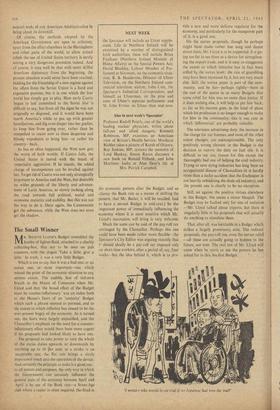The Small Winner
m. 'IL SELWYN LLOYD'S Budget resembled the bottles of lighter-fluid, attached to a charity collecting-box, that are to be seen on pub counters,. with the slogan 'Take a little, give a little.' In truth, it was a very little Budget.
Which is not to say that it was a bad one, or an unfair one, or--most important—one which missed the point of the economic situation to any serious , extent, The audible hiss of indrawn breath in the House of Commons when Mr. Lloyd said that 'the broad effect of the Budget must be counter-inflationary' was an index both to the House's fears of an 'austerity' Budget which such a phrase seemed to portend, and to the extent to which inflation has ceased to be the ever-present bogey of the economy. As it turned out, the fears were largely unjustified,, and the Chancellor's emphasis on the need for a counter- inflationary effect would have been more cogent if his proposals had looked likely to have one.
The proposal to take power to vary the whole of the excise duties upwards or downwards by anything up to 10 per cent. at a stroke is an acceptable one; the flat rate brings a nicely impersonal touch into the operation of the device. And certainly the principle at stake is a good one: to all intents and purposes, the only wayin which the Government can seriously influence the general state of the economy between April and April is by use of the Bank rate—a Stone-Age club where a rapier is often required. (So fixed is the economic pattern after the Budget, and so clumsy the Bank rate as a means of shifting the pattern, that Mr. Butler, it will be recalled, had to have a second Budget in mid-year.) So the important power of immediately influencing the economy where it is most sensitive which Mr. Lloyd's• innovation will bring is very welcome.
Much the same can be said of the pay-roll tax envisaged by the Chancellor. Perhaps this one could have been made rather more flexible—the Spectator's City Editor was arguing recently that if should ideally be a pay-roll tax imposed only on short-time workers, after a period of, say, four weeks—but the idea behind it, which is to pro- vide a new and more-delicate regulator for the economy, and particularly for the manpower part of it, is a good one.
On the surtax proposals, though he perhaps might have made rather less song and dance about them, Mr. Lloyd is to be supported. It is go- ing too far to sec them as a device for strengthen- ing the export trade, and it is easy to exaggerate the extent to which initiative has in fact been stifled by the surtax level : the rate of grumbling may have been increased by it, but not very much else. Still, the surtax payer is part of the .com- munity, and he has—perhaps rightly—been at the end of the queue in so many Budgets that some relief for him was no more than justice. If it does nothing else, it will help to put him back, as far as his income goes, in the kind of place which his profession is no longer enough to make for him in the community; this is one case in which 'differentials' arc probably valuable.
The television advertising duty, the increase in the charge for car licenses, and most of the other minor changes, are unexceptionable. The only positively wrong element in the Budget is the decision to restore the duty on fuel oils, It is difficult to see any reason for this except the thoroughly bad one of helping the coal industry. Trying to save dying industries has long been an occupational disease of Chancellors (it is hardly more than a lucky accident that the Exchequer is not heavily subsidising the shale-oil industry), and the present one is clearly to be no exception.
Still, set against the positive virtues elsewhere in this Budget, this seems a minor blemish. The Budget may be faulted only for sins of omission —Mr. Lloyd talked about exports, but there is singularly little in his proposals that will actually do anything to stimulate them.
That, after all, was inevitable in a Budget which strikes a largely promissory note. The indirect proposals, the pay-roll tax, even the surtax relief —all these are actually going to happen in the future, not now. The real test of Mr. Lloyd will come when he starts to use the powers he has asked for in this, his first Budget: 'I wonder who would be on trial if we Japanese had won the war?'














































 Previous page
Previous page